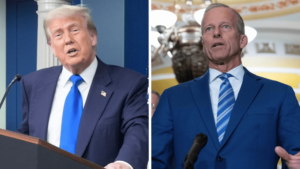Congress
Trump’s California troop deployment is impeachable, CBC chair says
The chair of the Congressional Black Caucus said President Donald Trump should be impeached over the deployment of the National Guard in Los Angeles in response to recent street clashes over immigration enforcement.
“I definitely believe it is. But we’ll cross that bridge when we get to it,” Rep. Yvette Clarke of New York said Tuesday when asked at a news conference if she considered Trump’s decision to send in the troops over the objections of state and local officials an impeachable offense.
Other Democrats didn’t go as far when asked about impeachment Tuesday.
“We’ll cross that bridge when we get there,” Rep. Adriano Espaillat (D-N.Y.), chair of the Congressional Hispanic Caucus, said in an interview. “I have to study all the facts. This is not over yet, but it certainly hasn’t started out in a good way.”
Democrats have railed against the use of the National Guard to respond to the protests, calling it a threat to democracy. California plans to sue over the use of the Guard, arguing Trump overstepped by up the troops without the signoff of California Gov. Gavin Newsom, a Democrat.
“The chaos is the bait and the switch is a constitutional crisis and power grab,” Rep. Jimmy Gomez (D-Calif.) told reporters at a separate news conference from Clarke’s held earlier Tuesday.
Democratic leaders have generally tamped down any pushes to impeach Trump. An earlier effort by Rep. Shri Thanedar (D-Mich.) fizzled out amid a fierce backlash in the party, and House Democratic Caucus Chair Pete Aguilar of California said “House Democrats aren’t focused on impeachment today” when he addressed reporters after Clarke spoke Tuesday.
“We are focused on holding the president and House Republicans accountable for the policies that attack the basic needs, like health care and food assistance,” he said.
Rank-and-file members such as Rep. Emily Randall (D-Wash.) are skeptical of the odds of success for impeachment with the House and Senate held by the GOP.
“An impeachable offense and what we can actually get across the finish line are two different things, and we saw Donald Trump impeached twice and re-elected,” she said. “So do I think this is unconstitutional and un-American? Yes. Do I think the American people oppose it? Yes.”
Congress
Rick Scott drafts key Medicaid amendment ahead of voting marathon
Florida Sen. Rick Scott is circulating text of his amendment to the GOP megabill that would effectively end a key Medicaid financing mechanism after 2030.
The provision won the backing of Senate Majority Leader John Thune during an eleventh-hour negotiating session held Friday night as a procedural vote was held open to win over Scott and other holdouts. It is expected to come up during the “vote-a-rama” set to take place overnight Sunday into Monday where dozens of amendments will be debated and voted on.
Scott said Sunday he’s “very confident that my amendment is going to pass.” Other Republicans are skeptical, with several in the GOP ranks nervous about cutting too deeply into Medicaid.
Under the amendment, the federal government’s 90 percent cost share for Medicaid enrollees made newly eligible under the 2010 Affordable Care Act will end on Dec. 31, 2030. Beneficiaries who were enrolled prior to that date would be grandfathered in at the old rate, but new enrollees would see their medical costs reimbursed at the lower “FMAP” rate, which can be as low as 50 percent, with states picking up the rest.
The amendment is co-sponsored by GOP Sens. Ron Johnson of Wisconsin, Mike Lee of Utah and Cynthia Lummis of Wyoming, as well as Finance Chair Mike Crapo of Idaho.
Congress
Republicans move forward with controversial megabill accounting move
Senate Republicans are on the cusp of formally adopting a controversial accounting tactic to zero out much of the cost of their massive domestic policy bill.
The matter came to a head on the Senate floor Sunday afternoon, when Democrats sought to prevent the use of the current policy baseline, as the tactic is known. Minority Leader Chuck Schumer objected to the maneuver and accused Republicans of setting a new precedent with the “budgetary gimmick.”
The Senate is set to vote on Schumer’s objection later Sunday or Monday, but Republicans believe their members will back up Senate Majority Leader John Thune and Senate Budget Chair Lindsey Graham.
That’s in part because they were able to sidestep a situation where senators would be asked to overrule Parliamentarian Elizabeth MacDonough on the baseline question. Instead, Republicans are asserting that Graham (R-S.C.) has the ability to establish which baseline is used under the 1974 law governing the budget process, rather than having MacDonough issue a formal ruling.
“There is nothing to debate and we consider this matter settled,” Graham spokesperson Taylor Reidy said.
The revised baseline allows Republicans to essentially write off the $3.8 trillion cost of extending tax cuts passed in 2017 that are set to expire at the end of the year. The effect on the megabill’s bottom line is profound as a pair of new Congressional Budget Office reports show.
One, released late Saturday night using the current policy baseline, showed the legislation would reduce the deficit by $508 billion. The other, released Sunday morning using the traditional method accounting for expiring provisions, showed the megabill would increase the deficit by $3.25 trillion.
“Things have never, never worked this way where one party so egregiously ignores precedent, process and the parliamentarian, and does that all in order to wipe away trillions of dollars in costs,” Sen. Patty Murray (D-Wash.) said during a speech on the Senate floor Sunday.
The maneuver came as little surprise. The GOP plan has been quietly in the works for months, and Thune had suggested they would reprise the no-formal-ruling strategy they’d used earlier in the process of passing the megabill.
“As we did on the budget resolution, we believe the law is clear that the budget committee chairman can determine the baseline we use,” Thune told reporters. Graham on Sunday embraced the CBO ruling showing the deficit savings — and his own authority to make the accounting change: “I’ve decided to use current policy when it comes to cutting taxes,” he said. “If you use current policy, they never expire.”
The baseline change is crucial for Senate Republicans because under the budget blueprint they adopted earlier this year, the Finance Committee provisions in the bill can only increase the deficit by a maximum of $1.5 trillion. The bill now under consideration wouldn’t comply under the old accounting method.
Sen. Ron Wyden (D-Ore.), the top Finance Democrat, called it “budget math as fake as Donald Trump’s tan” and said the GOP amounted to a “nuclear” choice that would weaken the chamber’s 60-vote filibuster.
“We’re now operating in a world where the filibuster applies to Democrats but not to Republicans, and that’s simply unsustainable given the triage that’ll be required whenever the Trump era finally ends,” he said.
Congress
Megabill reading wraps up after nearly 16 hours
Senate clerks have completed a nearly 16-hour reading of the GOP’s 940-page megabill. Clerks began reading the text aloud at 11:08 p.m. Saturday and finished Sunday at 3:03 p.m.
By refusing to waive chamber rules allowing for reading, Senate Democrats hoped to create an opportunity to highlight some of the most unpopular issues in the legislation. Now, under Senate rules, there will be 20 hours of the debate evenly divided between Democrats and Republicans.
Democrats are expected to use their full 10 hours, while Republicans are expected to take only a couple hours. That would mean the vote-a-rama — a marathon series of amendment votes — will begin sometime early Monday morning, though senators could agree by unanimous consent to delay it.
The GOP megabill is by no means finalized. Party leaders continue to negotiate to tweak the bill in ways that will win 51 votes in the Senate while also garnering enough votes to pass in the House later this week without further modifications. Republicans also continue to deal with the chamber’s parliamentarian, who continues to review whether parts of the bill comply with the budget rules the GOP is using to pass the bill along party lines.
-

 The Josh Fourrier Show8 months ago
The Josh Fourrier Show8 months agoDOOMSDAY: Trump won, now what?
-
Uncategorized8 months ago
Bob Good to step down as Freedom Caucus chair this week
-

 Politics8 months ago
Politics8 months agoWhat 7 political experts will be watching at Tuesday’s debate
-

 Politics8 months ago
Politics8 months agoHow Republicans could foil Harris’ Supreme Court plans if she’s elected
-
Economy8 months ago
Fed moves to protect weakening job market with bold rate cut
-
Economy8 months ago
It’s still the economy: What TV ads tell us about each campaign’s closing message
-

 Politics8 months ago
Politics8 months agoRFK Jr.’s bid to take himself off swing state ballots may scramble mail-in voting
-
Uncategorized8 months ago
Johnson plans to bring House GOP short-term spending measure to House floor Wednesday






